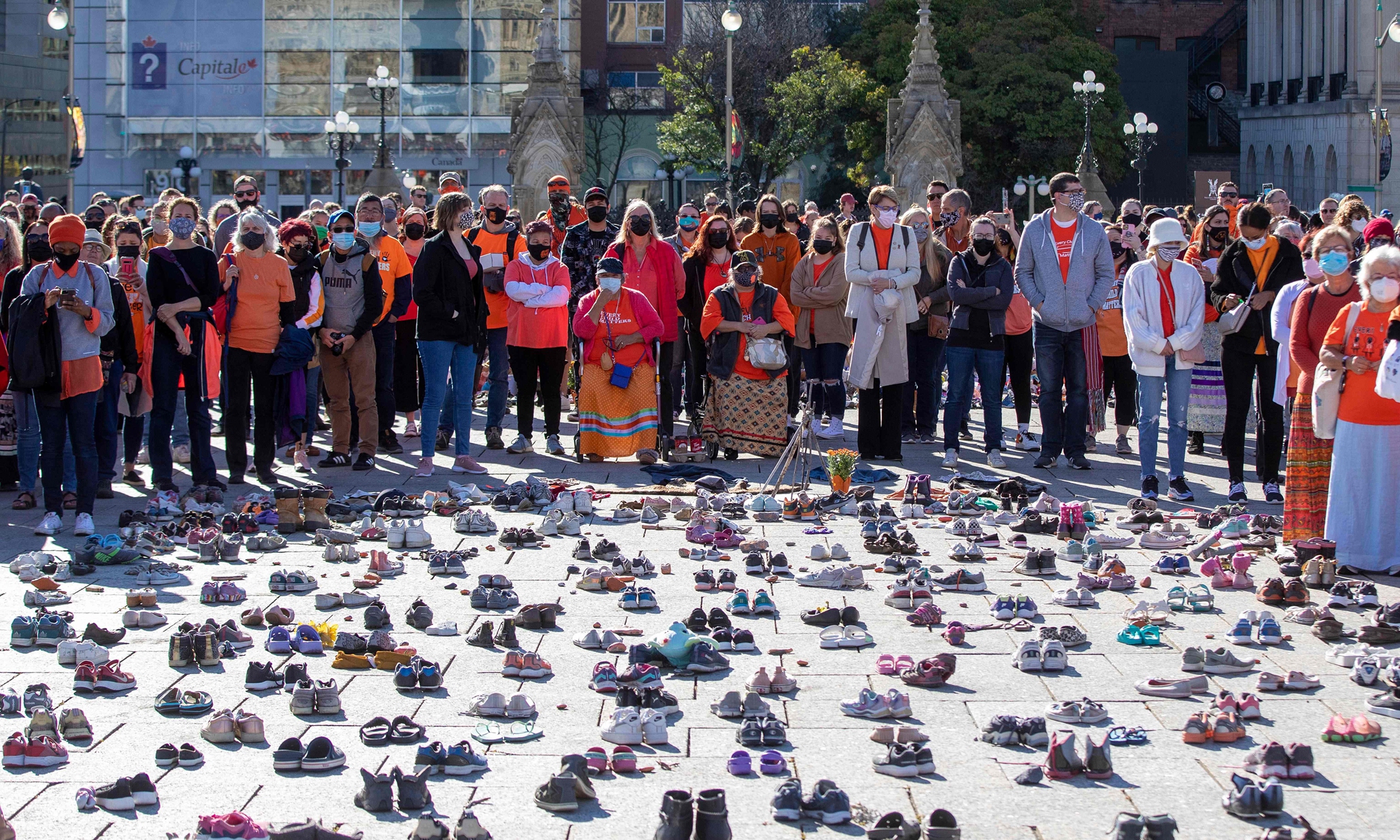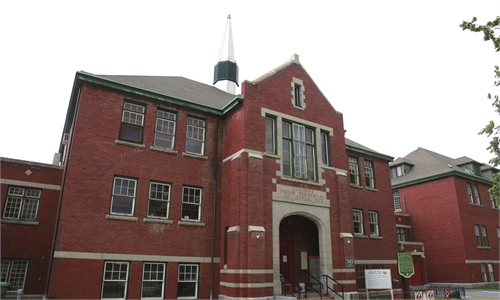
People stand around shoes that honor all the missing indigenous children during the first National Day for Truth and Reconciliation, on Parliament Hill in Ottawa, Canada, on September 30, 2021. Photo: VCG
Editor's Note:The residential school system in Canada has impacted multiple generations of indigenous peoples, causing long-term detrimental effects. More than three years ago, unmarked graves containing the remains of 215 children were found in Canada at a former residential school which was set up to assimilate Indigenous people, sending shock waves across the world. In late October, Canada's Office of the Special Interlocutor concluded that the indigenous children who died and were buried at residential schools are not "missing" but were systematically "disappeared," urging the government to make reparations. In an interview with Global Times (GT) reporter Wang Wenwen, Garry Gottfriedson (Gottfriedson), a residential school survivor from the Secwepemc Nation, recalled his past bitter experience and his expectation of the Canadian government.
GT: As a residential school survivor, can you tell me what life was like in a residential school? How did this experience affect your later life?
Gottfriedson: I was there from the age of five. I had older brothers and sisters that were already there. It was very, very scary when I first walked in, because the first thing that happened was that I was told I was never to talk to my sisters or any girls. The first thing they did was split my family up.
Then, we were forced into religion. It was very scary because in religion, they talked about the devil and made the devil sound so terrible to us. They frightened us a lot. I was very much afraid of going to hell and burning forever and these terrible demons were going to capture me. When you're a child, your imagination is very strong.
We were taught how to work in gardens, fields and shops. Our actual education was not that good. We didn't get very much reading, writing, math, science or social studies or anything. It was mostly religion. The goal of the residential schools was only to get us to be peasants in the country and even below the peasants. That early experience set the stage for a very difficult future for us.
GT: What role did residential schools play in destroying the indigenous culture? What has been the most harmful effect of residential schools on human rights?
Gottfriedson: My grandmother, who died in 1969, told me that in the 1920s the Canadian government and the church gathered all of our spiritual objects - our drums, our rattles, our prayer pipes, anything to do with our culture and religion - and burnt everything in front of my grandmother and everybody. After that, they forbade us to speak our language, to practice our culture. Now, I do speak my native language. I'm not as fluent as I possibly could be. My parents wouldn't let us speak our language as they were afraid for us. They had spies within our community that would tell the priest and the policeman because it was forbidden for us to speak our language. Everything was done in secret, everything went underground.
The residential schools created a division within the family. They didn't teach us about how to be a family. They took away our language and culture. All of the people that went through the residential school system did not know how to interact between male and female, so abuse became an issue. Family structures began to break down. Community structures began to break down. The severity of the treatment of our people in residential schools resulted in alcoholism, suicides and murders.
Laws in Canada, the Indian Act, the Potlatch Ban, the Residential School Act, support a process of genocide in Canada and the complete destruction and violation of a human race. It's a complete violation of our human rights. That any culture goes out deliberately to destroy another culture completely is an act against human rights in itself. We not only have human rights in terms of the physical aspect, but the intellectual aspect as well as the spiritual aspect. Those are all violations against human rights.
GT: Why did the Canadian government fail to properly address the issue of residential school abuses? Was it afraid that the truth might come out, that the indigenous people were not, and are still not, respected?
Gottfriedson: The Canadian government had done an excellent job of hiding Indigenous policy from the Canadian public. It was not taught in schools. It was never talked about in Canadian history, so Canadians themselves don't know what happened to our people. What they do know is that we were savages and that we were bad.
The 215 bodies were in my community. When I was a little kid, we were told never to be alone, because kids disappear and they kill kids and they bury them in the orchard. The general public in Canada was shocked when that was in the media. But the Canadian government tried to downplay it. It hid that part of history from the general people in Canada, because Canada doesn't want the world to think that it is bad. It did this to save its own image, so the world would not see that is bad in any way.
It's an embarrassment to Canada. They have a lot of explaining to do to their own people here in Canada. And there's a movement of different people within universities to talk about Canada's role in genocide pertaining to indigenous people here. The public is starting to understand this is a part of history that they didn't know about. They're trying to hold the country accountable for it. It has made a huge impact across the country.
GT: Will this issue be forgotten?
Gottfriedson: No. I don't think it will be forgotten, because there are too many people that are becoming aware of it now. And I think that Canada will have to eternally face it within the country. And then at some point, they're going to have to face the rest of the world and say this is a dirty part of our history, but we're going to move forward in some way. We have to fight and we have to fight hard. The consequence is that Canada is going to get stuck in a very ugly situation internationally and nationally. Canada's image and reputation are going to be tarnished on an international level. People in Canada right now are losing a lot of faith in the government, because they keep trying to hide things.
GT: In an era when human rights issues are highly valued by countries around the world, do you think the Canadian government's avoidance of this issue will make it less convincing when discussing human rights issues on the world stage?
Gottfriedson: I think so. Other countries must hold Canada accountable. They could tell Canada that you've got no place to talk on a world level about human rights unless you clean up your own house. The Canadian government should acknowledge it, deal with it, make things correct. Let's get rid of some of these oppressive policies that are still alive in Canada today. Canada promotes white supremacy, but in a very polite way.

